Q. I’m thinking about recycling the household wastewater to water our backyard garden. Are the chemicals in the water from the soap, shampoo, etc., harmful to plants?
A. Recycling household water is not a bad idea, however, it’s not the ideal answer for everyone just like solar panels for electricity. Household wastewater is called Graywater. It gets its name from the cloudy appearance of the leftover water from baths, showers, hand basins or a washing machine. Black water refers to any water containing human waste while fresh or portable water is called white water.
Since Graywater hasn’t been disinfected, you need to use a common sense approach to eliminate any potential hazard. Shower and bathroom sink water is the best to recycle. Food particles and grease are the biggest concerns with kitchen water from cooking, dishpan and food preparation. For plants, traditional soaps and detergents pose the biggest threat. Biodegradable soaps appear to have the least harmful effect. There are a number of environmentally friendly products available that reduces this risk. With recycled washing machine water, avoid all modern detergents that whiten, brighten, soften or have “enzymatic powers.” In addition, avoid Bleach and Borax products and anything containing chlorine and boron. Although these are secondary plant nutrients, they can quickly build up to toxic levels in soils. Graywater is applied to landscape trees and most shrubs along with turf with no ill effects. But, it’s used sparely on Azaleas, Begonias, Camellias, Rhododendrons, Blueberries and other acid-loving shrubs as the soil can become more alkaline from the chemicals. It can be used on containers and with edibles with precautions. Gray water is always applied directly to the ground. You should avoid splashing it on to the foliage plants, thus, it’s not recommended for root crops such as, radishes, carrots, beets, etc. In addition, you should avoid edible that mature close to the ground such as cucumbers, strawberries, squashes and leafy vegetables like spinach, Swiss Chard, and lettuce. Gray water is best used on those crops that mature above the ground like beans, tomatoes, peas, corn and eggplant. The biggest hurdle you need to address is the collection, storage and distribution of the Graywater. The answers to these questions, more than likely, make a good idea impractical for most. You should also check with your local water agency for any incentive installing a Graywater system within a residence. Here are several other points to remember: Fresh water is rotated with gray water to flush or leach out any harmful build-up. Mulching plants along with cultivating is encouraged, as the naturally occurring microorganisms break down the wastewater residue or bacteria. Plant should be fed with organic type fertilizers containing the naturally occurring microbes and mycorrhizae, such as Dr. Earth, FoxFarm, Happy Frog and other similar brands. Again, these products can break down harmful residues.
In summary, the recycling household water is an effective water-wise technique for general ornamental landscape plants and grasses; however, it does require fair amount of planning and resources to set up efficiently.
Buzz Bertolero is Executive Vice President of Navlet’s Garden Centers and a California Certified Nursery Professional. His web address is www.dirtgardener.com and you can send questions by email at dirtgarden@aol.com or to 360 Civic Drive Ste. ‘D’, Pleasant Hill, Calif. 94523 and on Facebook at Facebook.com/Buzz.Bertolero
Leave a Reply